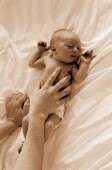CCHD screening would detect many nonsyndromic cases

(HealthDay)—Universal critical congenital heart defect (CCHD) screening is expected to detect a considerable number of nonsyndromic CCHD cases, but a similar number of false-negative screenings are also likely, according to a study published online May 11 in Pediatrics.
Elizabeth C. Ailes, Ph.D., M.P.H., from the U.S. Centers for Disease Control and Prevention in Atlanta, and colleagues developed a simulation model to estimate the number of true-positive and false-negative nonsyndromic cases of CCHD screening targets identified through screening.
The researchers estimated that 875 U.S. infants with nonsyndromic CCHDs would be detected annually through newborn screening, including 470 with primary CCHD screening targets. They also estimated 880 false-negative screenings, including 280 among primary CCHD screening targets. Under scenarios comparing "lower" (about 19 percent) and "higher" (about 41 percent) than current prenatal detection prevalences, the authors estimated that similar numbers of CCHDs would be detected.
"A substantial number of nonsyndromic CCHD cases are likely to be detected through universal CCHD screening; however, an equal number of false-negative screenings, primarily among secondary targets of screening, are likely to occur," the authors write. "Future efforts should document the true impact of CCHD screening in practice."
More information:
Abstract
Full Text (subscription or payment may be required)
Copyright © 2015 HealthDay. All rights reserved.

















